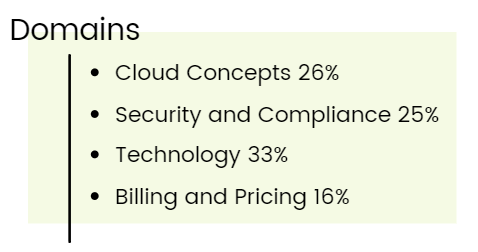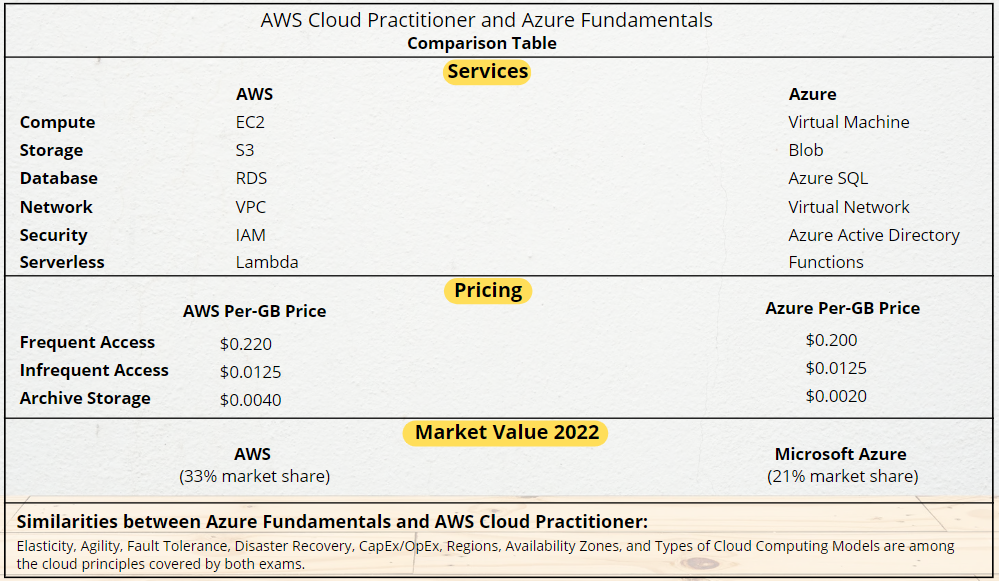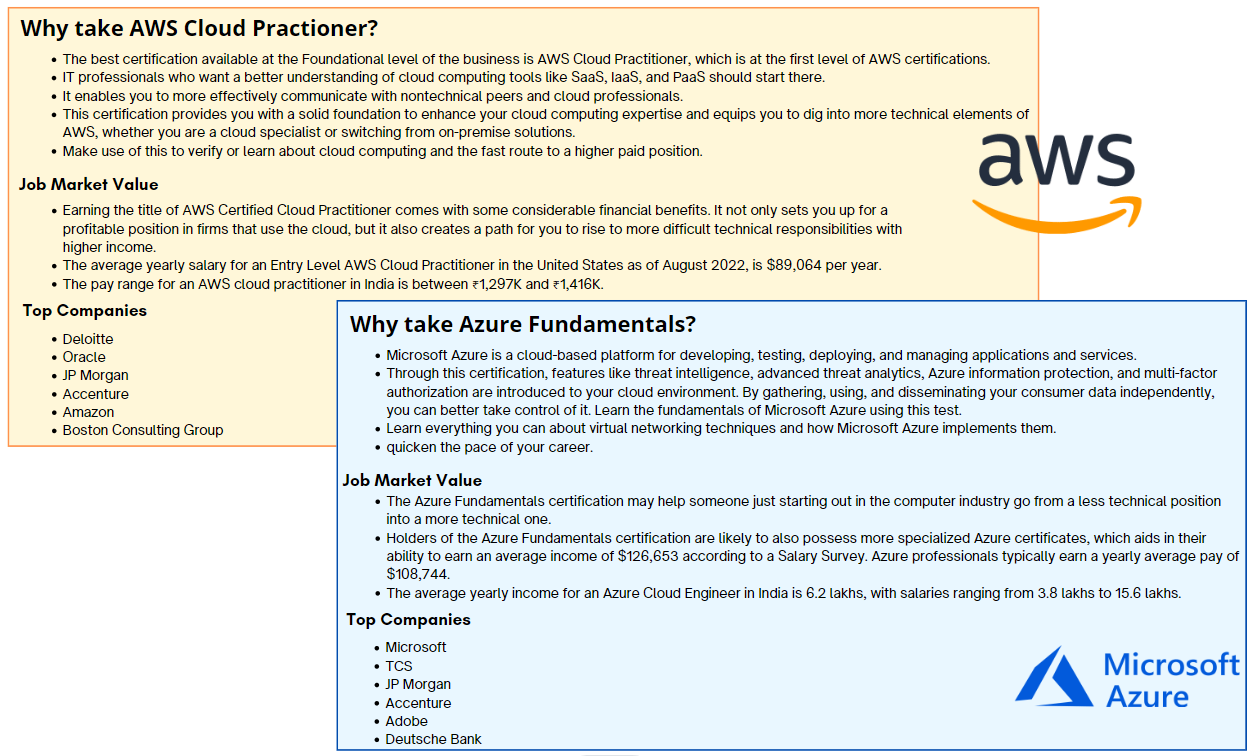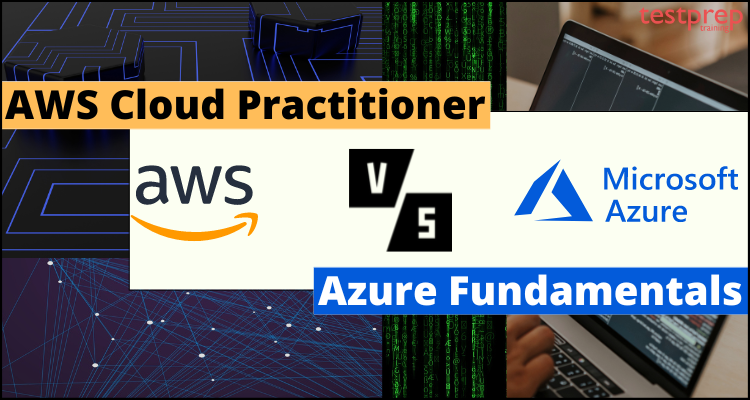As cloud computing continues to gain popularity, two of the biggest players in the industry are Amazon Web Services (AWS) and Microsoft Azure. Both AWS and Azure offer a wide range of cloud computing services and solutions, but getting started with either can be daunting. That’s where the AWS Cloud Practitioner and Azure Fundamentals certifications come in. These entry-level certifications are designed to give individuals a foundational understanding of their respective cloud platforms, making it easier for them to get started with cloud computing.
In this blog post, we’ll take a closer look at the AWS Cloud Practitioner and Azure Fundamentals certifications, and explore their similarities and differences. Whether you’re an IT professional looking to expand your skills or a business owner looking to migrate to the cloud, this blog post will help you make an informed decision about which certification is right for you.
Comparison between AWS Cloud Practitioner & Azure Fundamentals
- AWS Cloud Practitioner and Azure Fundamentals are two of the most popular entry-level certifications for cloud computing. These certifications are designed to provide individuals with a foundational understanding of cloud computing and the respective cloud platforms offered by AWS and Azure.
- AWS Cloud Practitioner is a certification offered by Amazon Web Services (AWS). It is designed to provide individuals with a basic understanding of AWS Cloud services and solutions. The certification covers a wide range of topics, including cloud concepts, AWS architecture, pricing and billing, security, and compliance. The AWS Cloud Practitioner certification is a prerequisite for many other AWS certifications.
- Azure Fundamentals is a certification offered by Microsoft Azure. It is designed to provide individuals with a basic understanding of cloud computing and the Azure cloud platform. The certification covers a wide range of topics, including cloud concepts, Azure services, security, privacy, compliance, and pricing. The Azure Fundamentals certification is a prerequisite for many other Azure certifications.
- While both certifications cover similar topics, there are some key differences between them. One of the biggest differences is that the AWS Cloud Practitioner certification focuses exclusively on AWS services and solutions, while the Azure Fundamentals certification focuses exclusively on Azure services and solutions. Additionally, the AWS Cloud Practitioner certification is more focused on practical skills and hands-on experience, while the Azure Fundamentals certification is more focused on theoretical knowledge.
- In terms of difficulty, both certifications are relatively easy to obtain. They are designed for individuals who are new to cloud computing and do not require any previous experience or knowledge. However, the level of difficulty can vary depending on the individual’s prior knowledge and experience with cloud computing.
- Overall, both AWS Cloud Practitioner and Azure Fundamentals are excellent certifications for individuals who are new to cloud computing and looking to gain a foundational understanding of AWS or Azure. The choice between the two certifications ultimately comes down to which cloud platform the individual plans to work with and which certification aligns better with their career goals.
Overview of AWS Cloud Practitioner
Individuals who can effectively demonstrate a broad understanding of the AWS Cloud, irrespective of a specific work description, are those who should take the AWS Certified Cloud Practitioner (CLF-C02) exam. The exam ensures a candidate’s competence in the following areas:
- Describe the benefits of the AWS Cloud.
- Recognize and describe the shared responsibility paradigm used by AWS.
- Identify optimal practices for security.
- Recognize the pricing, economics, and billing procedures of the AWS Cloud.
- The key AWS services, including computing, network, databases, and storage, are described and positioned.
- For typical use scenarios, listing the AWS services.
Target Audience
- The ideal applicant should have exposure to AWS Cloud design, implementation, and/or operations for at least six months or its equivalent.
- Candidates should have knowledge of well-constructed AWS Cloud solutions.
- They must have an understanding of the basics of IT services and how the AWS Cloud platform uses them.
- An understanding of the main AWS services, use cases, billing, pricing, security, and how the cloud affects your company
Knowledge Required
Anyone with a foundational understanding of the AWS platform is eligible to become an AWS Certified Cloud Practitioner. We recommend getting the following knowledge before taking this exam:
- AWS Cloud concepts.
- Compliance and security in the AWS Cloud.
- Knowledge of the essential AWS services.
- Understanding of the AWS Cloud’s economics.
AWS Cloud Practitioner Exam format
- Time duration: 90 minutes
- Exam cost: 100 USD
- Number of questions: 65 questions
- Questions types: Multiple choice or multiple responses
- Passing score: 700
- Exam Delivery: Pearson VUE and PSI (testing center or online proctored exam)
- Language: English, French (France), German, Indonesian, Italian, Japanese, Korean, Portuguese (Brazil), Simplified Chinese, and Spanish (Latin America).
Overview of Azure Fundamentals
Learning the fundamentals of Microsoft Azure will help you advance your career and get ready to explore more of the numerous technical options Azure offers, regardless of your level of experience. However, your basic understanding of cloud services and how they are delivered with Azure is validated by the Azure Fundamentals certification. In addition to Azure services, workloads, security, privacy, pricing, and support, candidates should be able to demonstrate a basic understanding of cloud principles.
An opportunity to demonstrate an understanding of cloud principles, Azure services, Azure workloads, security and privacy in Azure, as well as Azure pricing and support, is provided via the Azure Fundamentals exam. You could be a perfect candidate for the Microsoft Certified: Azure Fundamentals certification if you’d want to:
- Demonstrate your understanding of infrastructure as a service (IaaS), platform as a service (PaaS), and software as a service (SaaS) as well as public, private, and hybrid cloud ideas, models, and services (SaaS).
- Showcase your knowledge of how Azure supports compliance, security, privacy, and trust.
Furthermore, in order to earn the Azure Fundamental certification, you have to pass the Microsoft AZ-900 exam. Let’s learn about the exam!
Microsoft AZ-900 Exam
Candidates for the AZ-900 exam should have a basic understanding of cloud services and how Microsoft Azure is used to delivering such services. The test is designed for applicants who are new to Azure or who are just starting to work with cloud-based solutions and services. Candidates should be knowledgeable about basic technological principles, such as networking, storage, computing, application development, and application maintenance.
Knowledge area:
- It is recommended to be familiar with the ideas behind networking, storage, computation, application development, and application support.
*Your Azure Fundamentals certification can help you brush up on the fundamentals for other Azure role-based or specialty certifications, however, none of them require it.*
Exam format:
- Number of questions: 40-60 questions
- Exam cost: $99 USD
- Questions types: Multiple choice, build list, case studies, and additionally, it includes the introductory screens and instructions
- Passing score: 700
- Exam Delivery: Pearson VUE, Certiport
- Language: English, Japanese, Chinese (Simplified), Korean, Spanish, German, French, Indonesian (Indonesia), Arabic (Saudi Arabia), Chinese (Traditional), Italian, Portuguese (Brazil), Russian.
Domain Comparison: AWS Cloud Practitioner and Azure Fundamentals
The exam guide is probably the most important factor that has to be well understood while studying for the exam. This contains the exam’s weightings, test domains, and objectives. The primary content domains are shown along with their weights. Only scored material is represented by the percentage for each domain.
Cloud Practitioner Exam Domain

- Domain 1: Cloud Concepts
- Define the AWS Cloud and its value proposition
- Identify aspects of AWS Cloud economics
- Explain the different cloud architecture design principles
- Domain 2: Security and Compliance
- Define the AWS shared responsibility model
- Define AWS Cloud security and compliance concepts
- Identify AWS access management capabilities
- Identify resources for security support
Use the Cloud Practitioner tutorial to get a complete course outline!
- Domain 3: Technology
- Define methods of deploying and operating in the AWS Cloud
- Define the AWS global infrastructure
- Identify the core AWS services
- Identify resources for technology support
- Domain 4: Billing and Pricing
- Compare and contrast the various pricing models for AWS (for example, On-Demand Instances,
- Recognize the various account structures in relation to AWS billing and pricing
- Identify resources available for billing support
Azure Fundamentals Exam Domain

- Domain 1: Describe cloud concepts
- Describe cloud computing
- Describing the benefits of using cloud services
- Describing cloud service types
- Domain 2: Describe Azure architecture and services
- Describe the core architectural components of Azure
- Describing Azure compute and networking services
- Describe Azure storage services
- Describing Azure identity, access, and security
- Domain 3: Describe Azure management and governance
- Describe cost management in Azure
- Describing features and tools in Azure for governance and compliance
- Describe features and tools for managing and deploying Azure resources
- Describing monitoring tools in Azure

Understand the learning areas of the exam
When it comes to exam preparation, it is important to have all the essential study resources and training methods to have a better preparation. In order to help you pass Cloud Practitioner or Azure Fundamentals exam, both AWS and Microsoft Azure offers various study & training methods. Let’s understand them!
Study Resources for AWS Cloud Practitioner Exam:
1. Digital Training: AWS Certified Cloud Practitioner
You will learn how to evaluate your readiness for the AWS Certified Cloud Practitioner exam in this foundational-level course from Amazon Web Services (AWS). Candidates for the AWS Certified Cloud Practitioner certification must show they have a general understanding of the AWS Cloud, regardless of their intended employment role. You will examine the many topic categories of the test during this course and see how they relate to both the jobs of AWS Cloud practitioners and to certain fields of study. By analyzing the ideas that are being examined on the exam, you will also study example certification questions for each area.
The following tasks should be possible for you to complete once you’ve finished this course:
- Describe the benefits of the AWS Cloud.
- Recognize and describe the shared responsibility paradigm used by AWS.
- Identify optimal practices for security.
- Recognize the pricing, economics, and billing procedures of the AWS Cloud.
- For typical use scenarios, listing the AWS services.
2. AWS Cloud Practitioner Essentials Course
This new digital course is intended for anybody, regardless of technical role, who wants to get a fundamental grasp of the AWS Cloud. To expand your understanding of AWS Cloud, you’ll study fundamental AWS services, security, architecture, pricing, and support. Additionally, this course will aid in your test preparation for the AWS Certified Cloud Practitioner.
You will get knowledge about how to:
- List the working definition of AWS in brief.
- Explain the differences between on-premises, hybrid, and all-cloud models.
- Describe the AWS Cloud’s fundamental global infrastructure.
- Describe the AWS Cloud’s six primary advantages in detail.
- Determine an acceptable solution utilizing AWS Cloud services.
3. AWS Training and Certification Events
The free training opportunities offered by AWS Training and Certification assist today’s and tomorrow’s developers to make use of the AWS Cloud. Join AWS professionals for a training session that suits your needs, whether you’re looking to get a solid understanding of the cloud or to go deeply into a technical subject.
4. AWS Power Hour: Cloud Practitioner
You may gain the crucial knowledge you need to construct your future in the AWS Cloud by participating in this interactive series. Here, the hosts will lead you through the material with demonstrations and actual-world examples over the course of six episodes. Explore helpful materials, such as hints, documentation, and practice questions, conveniently organized by each episode. The episodes include:
- Intro to Cloud
- Global Infrastructure and Networking
- Storage and Databases
- Security
- Well-Architected Framework
5. AWS Whitepapers
Examine AWS whitepapers that are applicable to your test to learn about AWS services and best practices.
Study Resources for Azure Fundamentals (AZ-900) Exam
1. Microsoft Learning Path:
1. Describe cloud concepts
Modules in this learning path are:
- Cloud computing:
- You are introduced to cloud computing in this module. Deployment models, cloud ideas, and understanding of shared responsibilities are all covered.
- Advantages of adopting cloud services:
- The advantages of cloud computing are covered in this module.
- Types of cloud services:
- Several cloud service kinds are covered in this module, along with some of the benefits and use cases associated with each service type.
2. Describe Azure architecture and services
The architecture of Microsoft Azure as well as some of its most popular services and resources are all covered in this learning path. Modules in this learning path are:
- Fundamental elements of Azure’s architecture:
- The fundamental Microsoft Azure infrastructure parts are described in this module. The physical infrastructure, resource management, and the opportunity to build an Azure resource are all covered in this course.
- Azure’s networking and computing services:
- This session focuses on a few of the networking and computing services offered by Azure.
- Overview of Azure storage services:
- This session gives you an overview of Azure storage, covering topics like the various types of storage and how a distributed architecture may make your data more dependable.
- Explanation of Azure identity, access, and security:
- Some of the permission and authentication techniques offered by Azure are covered in this module.
3. Describe Azure management and governance
This learning path examines the management and governance tools you may use to manage your on-premises and cloud resources. Modules in this learning path are:
- Azure’s cost management:
- The ways to estimate, monitor and control expenses in Azure are covered in this subject.
- Azure governance and compliance capabilities and tools:
- You are introduced to technologies in this lesson that can assist with governance and compliance in Azure.
- Capabilities and resources for administering and deploying Azure services:
- The tools that you may use to manage your on-premises and Azure resources are covered in this section.
- Azure monitoring tools:
- The tools that you may use to monitor your Azure environment are covered in this topic.
2. Instructor-led courses
A basic understanding of cloud principles, fundamental Azure services, and Azure management and governance capabilities and tools will be provided through this course.
Audience Type:
- IT professionals who are just starting to work with Azure should take this course.
- This course does not require scripting knowledge and instead creates resources largely using the Azure portal and command line interface.
- This course will provide students the self-assurance they need to enroll in other role-based programs and earn credentials like Azure Administrator.
Job Market Value of AWS Cloud Practitioner and Azure Fundamentals
Because AWS is one of the most widely used cloud platforms worldwide, both technical and non-technical workers are looking for individuals with the AWS Cloud Practitioner Certification. Earning the title of AWS Certified Cloud Practitioner comes with some considerable financial benefits. It not only sets you up for a profitable position in firms that use the cloud, but it also creates a path for you to rise to more difficult technical responsibilities with higher income.
- The average yearly salary for an Entry Level AWS Cloud Practitioner in the United States as of August 2022, is $89,064 per year.
- The pay range for an AWS cloud practitioner in India is between ₹1,297K and ₹1,416K.
Any company embarking on a digital transformation journey or any IT professional trying to advance their career will find Azure Fundamentals training to be one of their most valuable assets. The Azure Fundamentals certification may help someone just starting out in the computer industry go from a less technical position into a more technical one.
- Holders of the Azure Fundamentals certification are likely to also possess more specialized Azure certificates, which aids in their ability to earn an average income of $126,653 according to a Salary Survey. Azure professionals typically earn a yearly average pay of $108,744.
- The average yearly income for an Azure Cloud Engineer in India is 6.2 lakhs, with salaries ranging from 3.8 lakhs to 15.6 lakhs.

Conclusion
Both AWS Cloud Practitioner and Azure Fundamentals are entry-level certificates that will provide you with a fundamental grasp of how the cloud functions and the services to employ based on your client’s demands. Since the ideas are essentially the same, understanding both will improve your credentials in the business. If you’re new to the cloud, you may begin your adventure by concentrating on one cloud platform. A well-rounded individual with knowledge of both AWS and Azure will undoubtedly have an advantage at work. Obtaining both certificates will help you start with the fundamentals of multi-cloud architecture and provide you with the ability to build and implement affordable solutions.




